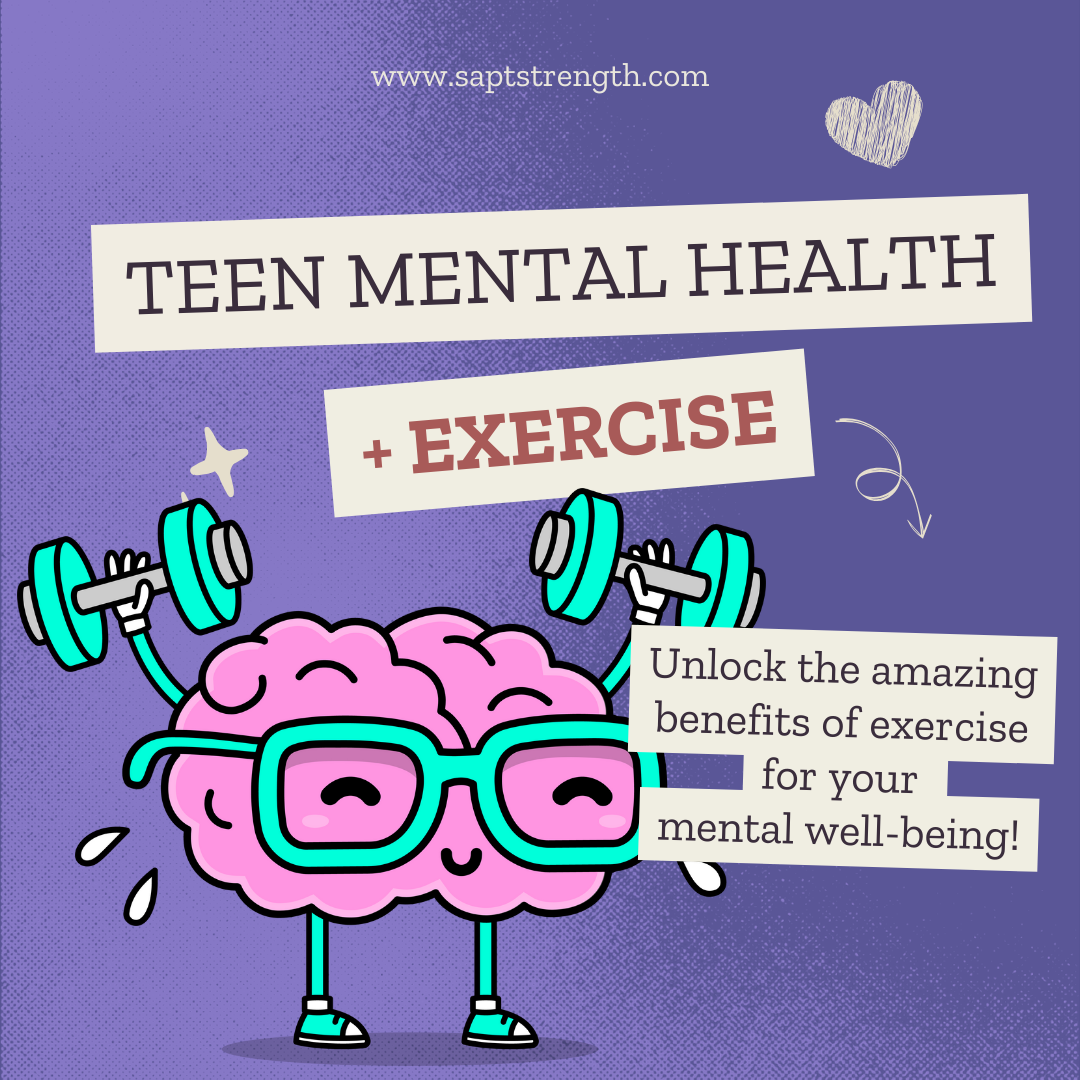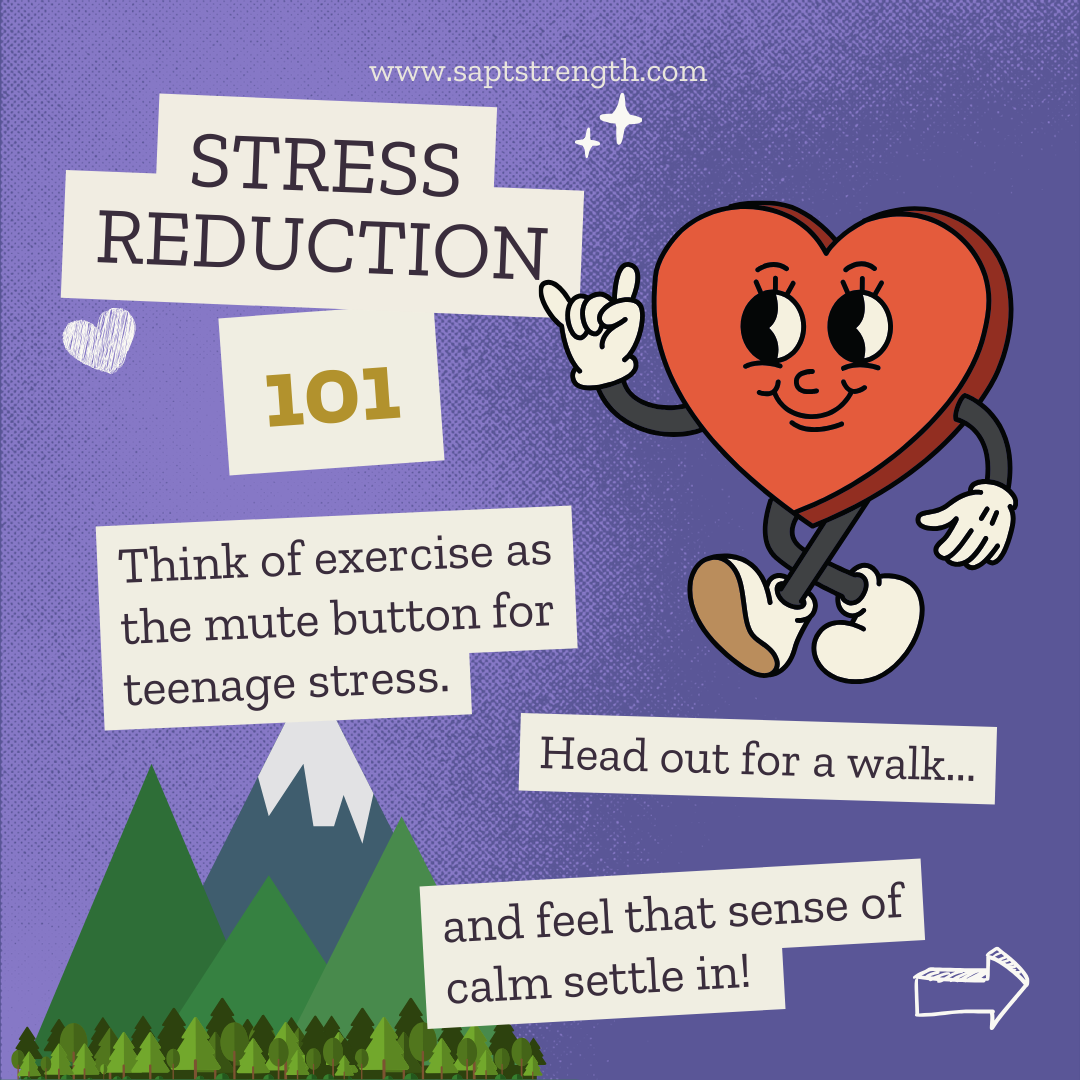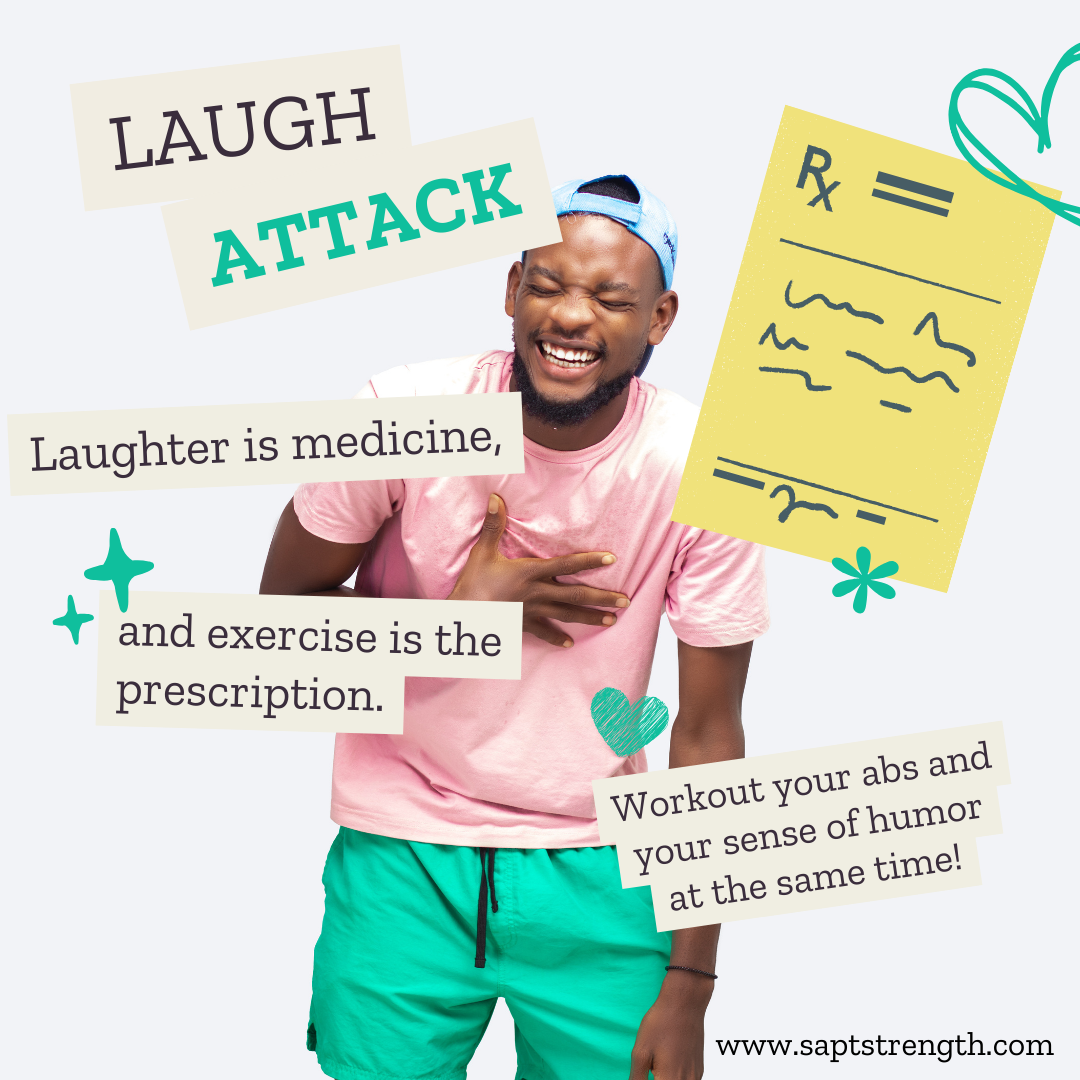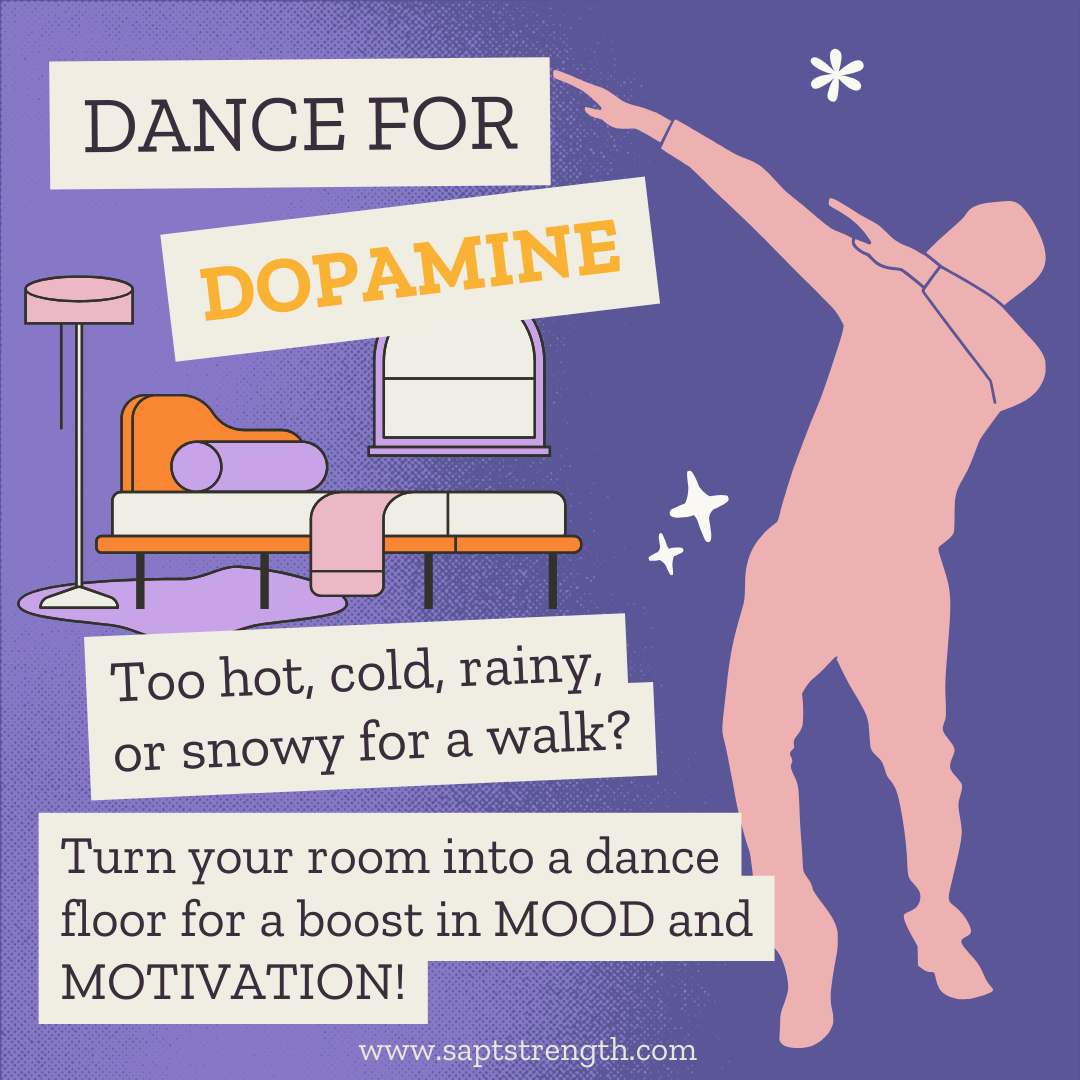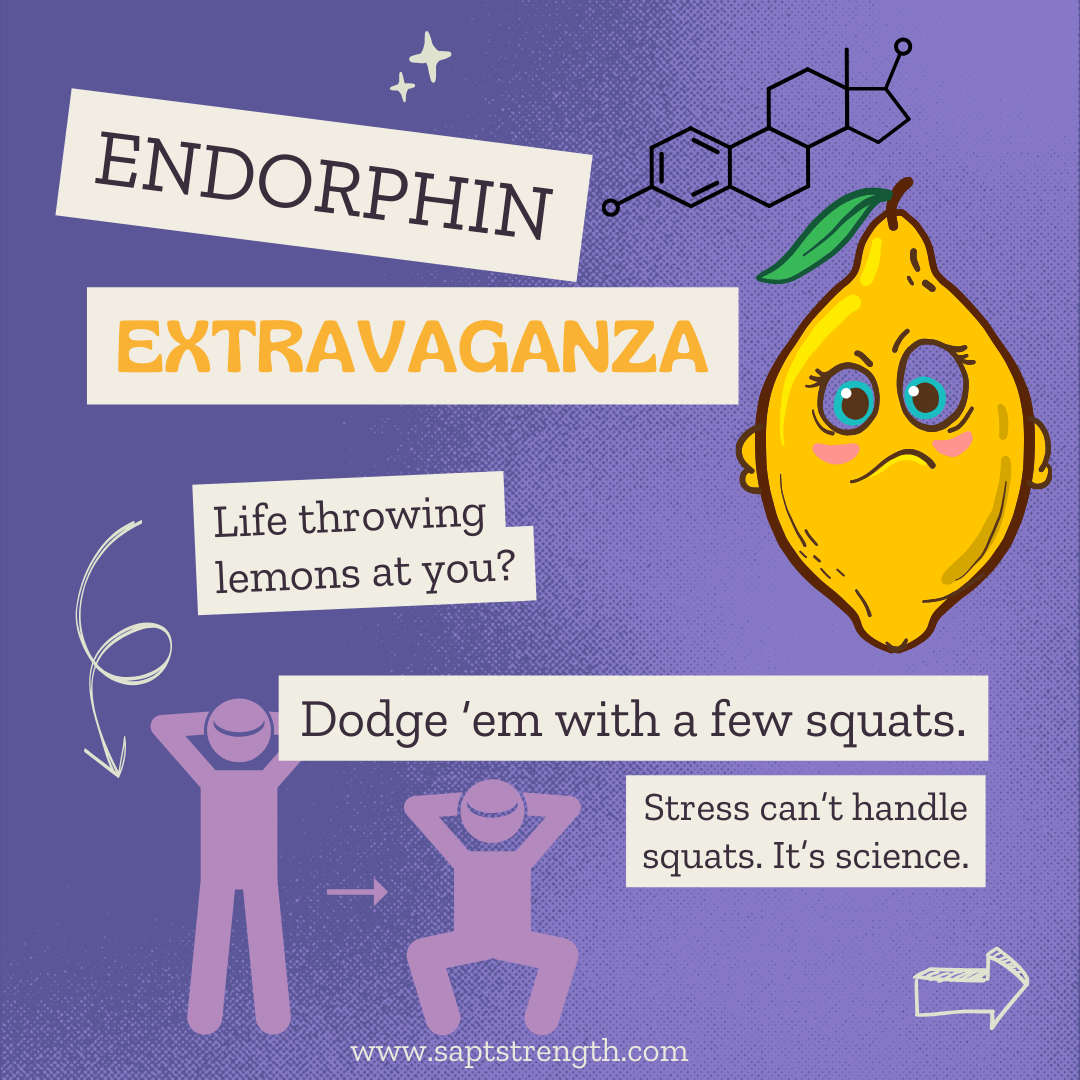Teen Mental Health + Exercise
Let's talk about something super close to my heart:
Teen Mental Health! As the founder of SAPT, I believe in the POWER of exercise to boost good vibes and make a positive impact on mental well-being! March 2nd is Teen Mental Health Day, but we think it deserves more attention than just one day, so we will be bringing awareness to the relationship between exercise and teen mental health ALL month!
Let's talk about something super close to my heart:
Teen Mental Health! As the founder of SAPT, I believe in the POWER of exercise to boost good vibes and make a positive impact on mental well-being! March 2nd is Teen Mental Health Day, but we think it deserves more attention than just one day, so we will be bringing awareness to the relationship between exercise and teen mental health ALL month!
Here are some general associations:
Improved Mood: Regular physical activity in early adolescence is often associated with enhanced mood and reduced feelings of anxiety and depression.
Cognitive Benefits: Engaging in physical activity is linked to improved cognitive function and academic performance in adolescents.
Stress Reduction: Physical activity can act as a stress buffer, helping adolescents cope with the challenges and pressures they may face.
Self-Esteem: Regular exercise is often correlated with higher self-esteem and a positive body image during early adolescence.
Better Sleep: Adolescents who are physically active may experience improved sleep quality, which is crucial for mental well-being.
Social Interaction: Participation in sports and physical activities fosters social connections and a sense of belonging, contributing to positive mental health.
Reduced Risk of Behavioral Issues: Physical activity has been associated with a lower risk of engaging in risky behaviors and substance abuse among adolescents.
Emotional Regulation: Physical activity can contribute to better emotional regulation and resilience, helping adolescents navigate challenging emotions.
Remember, these associations may vary based on factors such as the type and intensity of physical activity, individual differences, and environmental influences. For the latest and most specific findings, it's recommended to consult the latest research articles in the field.
Getting Dunked On
Fingers are pointed, laughs are boisterous, and a sense of embarrassment often fills a basketball player when he gets dunked on. I previously wrote about the reaction to Guard Brandon Knight getting dunked on by Center DeAndre Jordan. Brandon Knight: Dunked ON!
Having worked with basketball players at the high school, college, and pro level I have noticed that the “getting dunked on” phenomenon is something that exists at all levels of basketball. The act of dunking on someone should have more to do with the dunker rather than the player who was dunked on, yet players around the country often focus on the defender.
After the Knight dunk, NBA players took to twitter to voice their opinion:
Harrison Barnes, the rookie starting Small Forward for Golden State said, “Why jump B Knight?”
LeBron James said, “Hey coach Spo I'm gone have to just give those 2 pts up!! Hahahaha! Damn Brandon Knight. Gots to he more careful!”
Shelvin Mack, who recently signed a 10-day contract with the Atlanta Hawks said, “Why did he jump?”
Brandon Rush, who has played 2 games this year due to a season ending injury said, “Brandon Knight, no bro.”
Knight, who graduated from high school with a 4.3 PGA and was the Gatorade National Player of the Year, took the ribbing by his peers in stride by making light of the dunk. He also took the ball to the hoop on the very next possession and got to the foul line, where he made 2 free throws.
The perception that Knight did something wrong by making an attempt to block a shot is crazy to me. He was simply doing his job by playing defense. Great players are willing to take risks and fail. What if the 6-3 Point Guard was able to block the 7-foot Center? Surely that would have been impressive, and more importantly, it would have stopped 2 points from going in the basket.
It is with that in mind that I decided to lookup some of the greatest basketball players of all time and see if they’ve been dunked on. I found footage of Jordan, Barkley, Duncan, Ewing, Mutombo, O’Neil, Wade, Bryant, and James all getting dunked on. You can checkout my video here …..
Turns Out, the Legends Get Dunked On, Too!
So it turns out that Knight is actually in quite good company. And maybe, just maybe, he took his first step toward greatness. So the next time a guy gets dunked on, how about we give praise to not only the dunker, but also the player who was dunked on. After all, it certainly is an act work acknowledging, but for completely different reasons.
Description vs. Evaluation
Last week I was in Atlanta at the 2012 AASP (Association for Applied Sport Psychology) Conference. At the conference a presenter talked about the difference between description and evaluation. In sport, we often confuse descriptions with evaluations, which can impact where we direct our attention. Let me explain.
A basketball hoop can be described as being 10 feet tall, with a white net, and an orange rim. That’s what it is. It’s a clear description. Factual. When we describe we speak with certainty of what we see, but not necessarily how we feel.
An evaluation is based more on feelings. We evaluate and create opinions of how we think things will go in the future, or how they went in the past. Evaluations are opinions that lead to rankings, predictions, and analysis, but those aren’t facts. For example, I used to have an NBA draft website where I evaluated how prospects would transition to the NBA. Those evaluations were solely based on opinions, and trust me, I was wrong plenty with my evaluations.
Sports have become extremely evaluation based. Everyone wants to know which team is the favorite, who is the #1 seed, and who is the next great athlete. But, those aren’t facts, they’re simply how people evaluate the current situation. If sports were played simply based on evaluation they wouldn’t need to be played at all.
It’s important to be able to describe who you are. Be you and be that well. Even more importantly, as a team, make sure to direct attention to descriptions and leave the evaluations to the pundits.
50% OFF: The 50/50 Training Challenge
The 50/50 Training Challenge - 50% OFF for 1 Special Team!
If you're a regular reader of SAPTstrength, you've no doubt noticed our recent introduction of Mental Mondays which is leading the way to SAPT's additional focus towards mental preparation and coaching. Well, Mental Mondays are merely the tip of the iceberg in new service offerings that are directed at one specific portion of our mission statement:
Our mission is to provide quality comprehensive training products and services to help facilitate and educate our clientele towards athletic and intellectual success on every level from amateur to professional. To achieve our mission we will conduct business with the following responsibilities in mind: obey the law, take care of our employees, take care of our clientele, respect our competition, respect our environment, participate in our community...
I crafted that statement over 5 years ago. Happily, we've been adhering to this mission quite well. But, there is one main area that still needs work:
- "...help facilitate and educate our clientele towards... intellectual success on every level..." This one's now in our crosshairs!
Since we've recently teamed up with CAPE Performance Mental Coach Brian Levenson, SAPT is now capable of formally addressing the intellectual (or mental) success of our clients!
Our first official combined service offering is called The 50/50 Challenge.
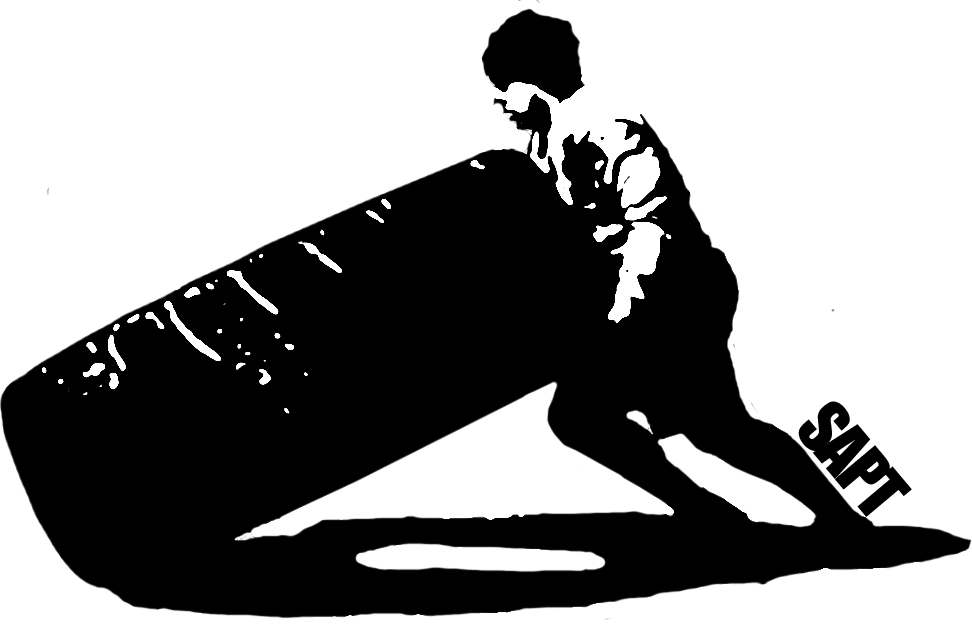 This challenge is a grueling combination of physical and mental training challenges to help your team improve cohesion and learn to handle & overcome adversity. *Think of this as similar in end goal to ropes courses, but with a direct link to tangible performance indicators and much closer to sport itself.
This challenge is a grueling combination of physical and mental training challenges to help your team improve cohesion and learn to handle & overcome adversity. *Think of this as similar in end goal to ropes courses, but with a direct link to tangible performance indicators and much closer to sport itself.
Throughout this one-day physical and mental intensive session, you and the team's coaching staff will learn how to reinforce your team’s and each individual’s mental approach to all aspects of training.
Your athletes will finish the day with a thorough understanding of how their mental game impacts and affects everything from their rehab programs, weight training, practices, and - ultimately - wins and losses.
Uncover and discover a secondary layer of benefits reaped from your team’s regular practices, strength and conditioning program, and competitions as the 5 Primary Physical and Mental Training Themes converge throughout the day:
- Focus and Concentration
- Team Cohesion
- Preparation/Routine
- Energy Management
- Controlling Controllables
Coaches: Steve Reed and Brian Levenson
Location: The SAPT training facility
Date: We will try to stick to Saturdays (but this can be customized)
Time: 9:00 AM to 3:00 PM 9:00 AM to 1:00 PM for this special offering
Cost: 1000.00 per team 500.00 for one special team!
Why the deep discount? It's simple, we've already booked some local NCAA D1 college programs and need the chance to get in a practice run to work out any kinks that may pop up!
If you want to take advantage of this offer, you must have a team that is available to come to the SAPT training facility for this challenge NO LATER THAN SEPTEMBER 1st!
Email, ME: sarah@studentathletept.com, to get signed up!
After all, you don't have to lose games to learn how to handle adversity!


